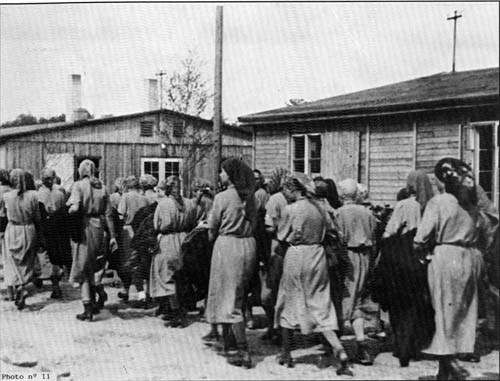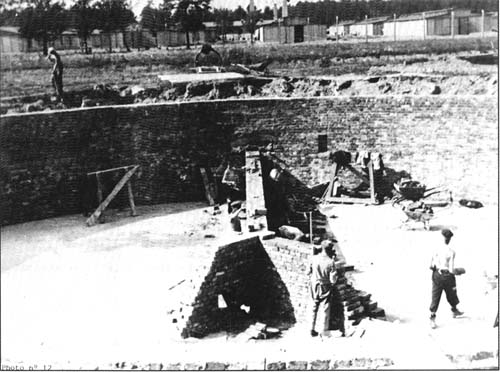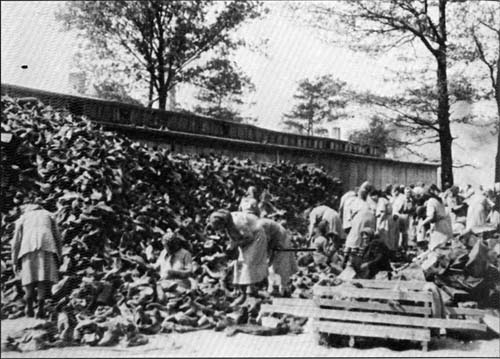 |
Photo 11 |
Photo 11
[Photo 153 of “l'Album d'Auschwitz” by Serge Klarsfeld] |
|
Contrary to what the author stated in “L'Album d'Auschwitz” (Seuil), photos 97, 98 and 99 of that work were not set in B.III along the effects huts, but on the Ringstraße, between the three administration huts of Kanada II and the Zentral Sauna. In May-June 1944, this column of Hungarian Jewish women selected as fit for work was marching north and was going to pass between Kremtatorien IV and V In the direction of the entrance to B.IIc (Hungarian women’s camp) their prohahle destination. The position of these women is shown as point 9 on the plan of Birkenau (next Sheet). Photo 11, looking northeast was taken by an SS photographer standing with his back to the Zentral Sauna while the column of prisoners was passing the entrance to the northern Effektenlagerstraße (Effects camp road) of Kanada II.
The error in pinpointing this photo and the two others in the series was due to the form of the huts in the background. This type of hut was to he found only in B.Ia and B.III, while B.II and Kanada II were equipped almost exclusively with the “stable” huts. On the basis of this difference, the author had concluded that the three photos must have been taken in B.III. However, Photo 12 shows that the three huts of the westernmost row of Kanada II were of a different model from the “stable” huts of the rest of Kanada. Furthermore, in the original attempt to situate the photograph, the position of the sun had not been taken into account in determining the orientation. While it is difficult to assess on this particular photo, the lighting on the two others then leaves no room for doubt.
Above the roof of the hut on the left are the two chimneys of Krematorium IV, with soot on their southern faces, no smoke emerging because the furnace had been out of order since May 1943. More than a year after Krematorium IV entered service, the size of the soot stains on its chimneys was still the same as on the photo taken in April 1943, another indication that the Krematorium cannot have worked for very long. |
|
|
| Photo 12 |
 |
| |
Photo 12
[PMO neg. no. 20995/445] |
| |
Birkenau sewage treatment plant 11(Kläranlage II) was between Krematorium III (to the south) and Kanada II (to the north). It comprised in particular five sedimentation basins numbered I to V from east to west. This photo was taken during the construction of basin IV, looking north, no doubt In summer 1943. It shows the first four rows of huts of Kanada II, the first row being different from the others, which are all “stable” type, a fact that is not very evident from the Bauleitung plans of Birkenau. In the background, between the second and third rows, part of the south wall of Krematorium IV, the section housing the undressing room/morgue, can be seen. Between its two chimneys appears one of Krematorium V. The distance between SS Sergeant Kamann and Krematorien IV and V was 320 m and 440 m respectively. As usual, neither Krematorium IV nor V was working, for not the slightest whistp of smoke can be seen escaping from their chimneys, which confirms that Krematorium IV was no longer used after May 1943 because it had suffered serious damage, and that Krematorium V was used very little if at all between the middle of 1943 and May-June 1944. |
|
 |
Photo 13 |
Photo 13
[Photo 184 of “l'Album d'Auschwitz”by Serge Klarsfeld |
|
Photograph of the storage of victims' shoes taken in the middle of Kanada II in May-June 1944. The SS photographer had left the north Effektenlagenstraße and advanced a few meters between two of the “stable” huts of the north row (probably between 6 and 7), the huts being numbered 1 to 10 (from west to east) and taken the photo looking nortthwest. The point where he was standing is point 13 on the plan of Birkenau (next Sheet).
Above the ridge of the “stable” hut it is possible to see the tops of the two chimneys of Krematorium IV (on the left) and one of Krematorium V (on the right). There is no smoke coming from any of them, of course. However, the background is full of smoke, especially on the right, to the extent that the outlines of the chimneys are somewhat indistinct.
The absence of smoke from the chimneys is easily explicable. Krematorium IV had been shut down since May 1943, despite an unsuccessful attempt to repair it in April 1944. The furnace of Krematorium V, also repaired in April 1944, had proved so unsatisfactory that open-air cremation ditches had been dug not far from its northwest comer. The smoke on the photo comes from bodies being cremated in one or more of these ditches, The prevailing wind being from the north, the smoke blew towards Kanada II, as corroborated by this photo.
In the author’s opinion, this photograph is one more piece of incriminating evidence regarding the extermination of the Hungarian Jews in May-June 1944, for it contains two criminal elements: the direct evidence of the mountain of shoes that cannot be rationally explained without extermination, and the indirect evidence of the smoke coming from the bodies of Jews found unfit for work being cremated in the ditches behind Krematorium V. |
|
|

